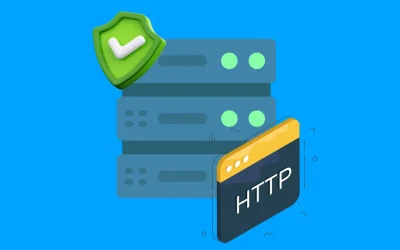Enhancing Online Security with Private Proxies
In our journey through the intricacies of private proxies, we navigated its exclusivity, speed, and various types.
Now, we delve into online security and explore how proxies play a pivotal role in fortifying your digital defenses.

Current Challenges in Online Security
Online security faces an evolving threat landscape. Cyber threats continue to grow in sophistication and diversity, ranging from traditional malware attacks to more advanced tactics like ransomware and phishing. According to recent statistics from Check Point Research, the number of cyber threats increased by 32% in 2023 compared to 2022.
Data breaches have also become a pervasive concern. Recent breaches have exposed sensitive information, leading to identity theft, financial fraud, and reputational damage. In 2023, IBM reported that there were 5,400 publicly disclosed data breaches globally, impacting over 22 billion records. This surge in incidents underscores the critical need for robust security measures to safeguard personal and corporate data.
As individuals share more personal information online, there’s a parallel increase in targeted attacks aiming to exploit this data. Cybercriminals often leverage social engineering techniques to trick individuals into revealing sensitive information. In a recent study conducted by Verizon, “74% of breaches involved the human element, which includes social engineering attacks, errors or misuse”. This study emphasizes the human element as a significant vulnerability in the security chain.
The Need for Robust Solutions
With the intensifying concerns over data privacy, the need for robust security solutions has never been more pronounced. Individuals are becoming increasingly aware of the value of their personal information and the potential consequences of its compromise. Norton’s recent survey reveal that 69% of global adults are more concerned about online privacy than before. This tudy highlighs a shifting paradigm where privacy is a top priority.
For businesses, the stakes are higher than ever. The financial and reputational fallout from a cyber incident can be catastrophic. Governments and regulatory bodies worldwide are also intensifying their focus on data protection and privacy. According to Fortune Business Insights, the global cyber security market size is projected to grow from $172.32 billion in 2023 to $424.97 billion in 2030, at a CAGR of 13.8%. This study reflects a recognition of the critical role that robust security plays in sustaining business operations and protecting customer trust.
How Private Proxies Contribute to Security
Anonymity and Privacy
Private proxies bolsters online security by ensuring anonymity and privacy. By masking your real IP address, they serve as a robust shield. They prevent websites, trackers, and potential cyber adversaries from accessing personal information. This addresses growing concerns about unauthorized access to user data, providing a crucial defense against data exposure.
Minimizing Exposure to Cyber Threats
the anonymity it provides significantly reduces your online footprint. It makes it challenging for cyber threats to pinpoint and exploit vulnerabilities. By enabling you to operate in the shadows, you can thwart potential attacks that often thrive on exposed information.
Secure Data Transmission
Private proxies incorporate encryption protocols, such as SSL and TLS, to secure the communication channel between your device and the web server. By encrypting data transmission, proxies create a secure tunnel. It shields your information from prying eyes during transit.
Preventing Targeted Attacks
Targeted attacks often hinge on the ability of adversaries to identify and focus on specific individuals or organizations. Private proxies disrupt this chain by hiding your IP address. It introduces an element of anonymity and unpredictability. These elements become a formidable defense against such targeted endeavors.
3 Tips for Maximizing Security with Private Proxies
1. Choosing the Right Proxy Provider: Selecting a reputable and trustworthy private proxy provider is the first step in ensuring enhanced security. Look for providers with a proven track record, robust encryption measures, and a commitment to user privacy.
2. Configuring Secure Connection Protocols: Optimize your security by configuring secure connection protocols. Ensure that your private proxy uses protocols like HTTPS to encrypt your data and protect it from potential eavesdropping.
3. Implementing Additional Security Measures: Complement the security features of private proxies by implementing additional measures. This may include using updated antivirus software, employing strong and unique passwords, and staying vigilant against phishing attempts.
Real-world Security Scenarios
Navigating real-world security scenarios with private proxies requires a tailored approach to address specific challenges effectively. Let’s explore how private proxies contribute to security in various contexts:
Web Scraping Security
Web scraping, while a valuable tool for gathering data, presents security challenges. It includes IP bans and data breaches. Private proxies mitigate these risks by anonymizing your web scraping activities. Anonymizing IP addresses to evade detection and encrypting data transmission.
Secure Social Media Management
Managing multiple social media accounts for marketing or personal use entails security risks such as account flagging and IP bans. Private proxies offer a solution by providing dedicated IP addresses. It ensures seamless account management without triggering security measures.
Protection in SEO Monitoring Activities
SEO monitoring involves analyzing website performance and search engine rankings, which can be compromised by IP bans and inaccurate data due to geo-blocking. Private proxies enable accurate SEO monitoring by masking your IP address and accessing search engines from diverse locations.
Conclusion
As we conclude, it is evident that the digital era demands not only heightened awareness of online security challenges but also proactive measures to counteract evolving threats. Private proxies stand as stalwart allies in this ongoing battle. It offers not just anonymity and encryption but practical solutions to real-world security scenarios.
Related Articles
How to Bypass IP Bans
IP ban is a security measure used by websites to block access from specific IP addresses. This mechanism is often employed to prevent malicious activities such as spamming, hacking attempts, and excessive web scraping. When an IP address is banned, the user or device associated with that address is restricted from accessing the website.
Cybersecurity Incident Response and Private Proxies
In the context of incident response, private proxies add a layer of anonymity and obfuscation. They make it more challenging for malicious actors to trace and target an organization’s online activities. Additionally, they enable organizations to establish an early warning system.
Geo-Targeting and IP Rotation with Private Proxies
Geotargeting involves tailoring online content to specific geographic regions. It allow businesses to reach local audiences and individuals to access regional content. The regular switching of IP addresses further enhances online anonymity and security when coupled with private proxies.



